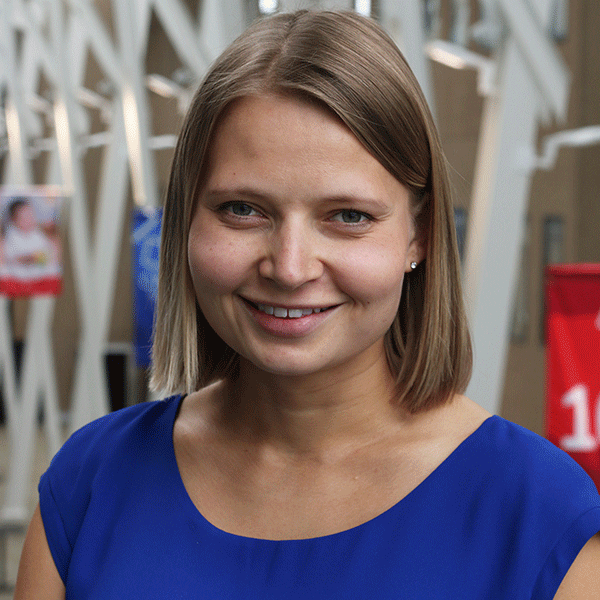May 21, 2021
Meet the UCalgary teams competing in 2021 edition of Global Healthcare Innovation Academy

Patients, families, and care providers use and work within the health-care system. They see first-hand where improvements could be made to enhance the quality of health-care delivery.
The Global Healthcare Innovation Academy (GHIA), an international scientific and business pitch competition, is a platform for these much-needed innovations.
The fourth GHIA competition will run virtually from June 7 to 9 (7 to 9 a.m. MDT), hosted by Unity Health Toronto. Vetted teams from around the world have submitted a four-minute video pitch in one of the competition streams: social, biomedical, and COVID-19 innovations.
The University of Calgary’s W21C Research and Innovation Centre at the Cumming School of Medicine (CSM) has been playing a pivotal role supporting innovation on the frontlines of health care as part of this international event since 2012. Winners from the W21C Innovation Academy move on to compete at GHIA.

Jill de Grood has been involved with the Global Healthcare Innovation Academy planning since 2012.
Julia MacGregor, UCalgary
“These events are a space where entrepreneurship, social impact and healthcare meet,” says Jill de Grood, director, development and partnerships at W21C. “You see innovative solutions presented by academics and health-care providers that have the potential to impact the health system globally.”
Built upon a strong international network with current and past partners from Switzerland, Hong Kong, South Africa, Qatar, Mexico, Australia, United Kingdom, and Eastern Canada, these connections ensure that the forward-thinking ideas have a launchpad for impact for the communities they serve.
2021 UCalgary GHIA competitors
Biomedical innovation competitors
Fluid Biotech
A UCeed-funded company, Fluid Biotech will present their implantable dissolving stent to divert blood flow. This revolutionary treatment for brain aneurysms developed by Dr. Alima Mitha, MD, and Dr. John Wong, MD, associate professors in the CSM and members of the Hotchkiss Brain Institute, allows for faster internal healing and non-invasive testing for patients, compared to traditional metal stents.
Smart Drain
Smart Biomedical is a cross-Canada collaboration between CSM faculty members Drs. Sumesh Thomas, MD, and Snyder Institute for Chronic Diseases member, Alex Chee, MD, with Dr. Wiley Chung, MD from Queen’s University. Their Smart Drain device aids health-care providers with inserting a chest tube to reinflate a collapsed lung. The device creates a conduit to easily insert the chest tube, and has the potential to increase patient safety, by reducing procedural errors.
Social innovation competitor
DESTINE Health
Translating research conducted previously with the university’s Calgary Stroke Program, CSM postdoctoral researcher and alumna Dr. Jessalyn Holodinsky, BKin’12, MSc’15, PhD’19, along with Dr. Noreen Kamal, PhD, at Dalhousie University, created DESTINE Health. It's a decision support tool used by health-care administrators to create and optimize transport protocols for acute stroke patients. The tool is cloud-based software, which is regionally customized to each health-care jurisdiction’s unique geography and hospital treatment capabilities and efficiency.
COVID-19 innovation competitors
Drones for the Delivery of Medical Supplies, Equipment, Treatments, and Diagnostic Testing to Remote First Nations Communities
Remote and rural Indigenous communities often have difficulty accessing health care and medical supplies, and these challenges have been exacerbated by the COVID-19 pandemic. A collaboration between CSM academics, SAIT technical experts, Alberta Health Services and the Stoney Nakoda Nations are looking to improve access by using drones to deliver COVID-19 test kits, personal protective equipment, and vaccines. Drones have the potential to remove geographic barriers between remote and rural Indigenous communities and major health centres, to reduce human-to-human contact and prevent disease transmission. The project is key to developing future drone-based medical delivery systems in Canada, and beyond.
TEKTELIC eDoctor
The company, co-founded by Schulich School of Engineering alumnus David Tholl, MSc’93, has designed eDoctor for individuals who require constant respiratory monitoring or are at a high risk of adverse effects from respiratory illness. This wearable digital device provides constant monitoring of key respiratory vital signs including heart rate, respiration rate, body temperature, chest expansion, activity level and body position and displays the data in a comprehensive, user-friendly application.
As a centre within the O’Brien Institute for Public Health, W21C is dedicated to changing the landscape of health care to make care better. “As a provider of research and validation services, it is exciting to support these health innovators to ensure their ideas address health system needs, can be used effectively, and create meaningful impact to our health-care system,” says de Grood.
GHIA Alberta Community Event Series
Leading up to GHIA, W21C is curating a week-long spotlight on Alberta innovation supports and services available for life sciences, digital health and health care. Collaborating with UCalgary and community partners, the GHIA Alberta Community Event Series June 1 to 8 will highlight the supports and services available to assist academics, entrepreneurs and companies bring their groundbreaking discoveries to market.
Canadian Innovation Week at UCalgary
As part of UCalgary’s partnership with the Rideau Hall Foundation, we are celebrating Canadian Innovation Week. Join UCalgary experts and researchers May 17-21, for a week of conversation, inspiration and ideas. Learn how you can get involved.






